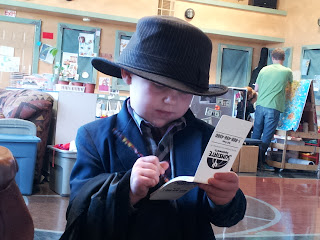"There is no simple answer to helping children to read and write.... Young children need lots of exposure to oral language and print material. They need to have the self-confidence to explore new ideas and feel the pleasure and excitement of listening and telling stories, the intimacy of sharing, the joy of learning."
This is the advice from Joan Lombardi in her Exchange article, "Promoting Language, Literacy, and a Love of Learning Makes a Difference."
This is the advice from Joan Lombardi in her Exchange article, "Promoting Language, Literacy, and a Love of Learning Makes a Difference."
"During the infant and toddler years, children need relationships with caring adults who engage in many one-on-one, face-to-face interactions with them to support their oral language development and lay the foundation for later literacy. During the preschool years, young children need a wide range of developmentally appropriate experiences to support literacy, including — but not limited to — positive, nurturing relationships with adults who engage in responsive conversations with individual children. Child care providers need to model reading and writing behavior and foster children's interest in and enjoyment of reading and writing through exposure to a print-rich environment and daily adult reading of high-quality books."
You can tell by the interest and expressions, that the children are mesmorized by the content of the book being shared. This is a great opportunity to introduce students to fluency. Fluency is defined as the ability to read a text accurately, quickly, and with expression. Fluency is important because it provides a bridge between word recognition and comprehension. Little ears can easily tell when a reader has good fluency during shared reading. Dont miss the great learning opportunity to read aloud to your children daily! They learn so much from this special time together!


















